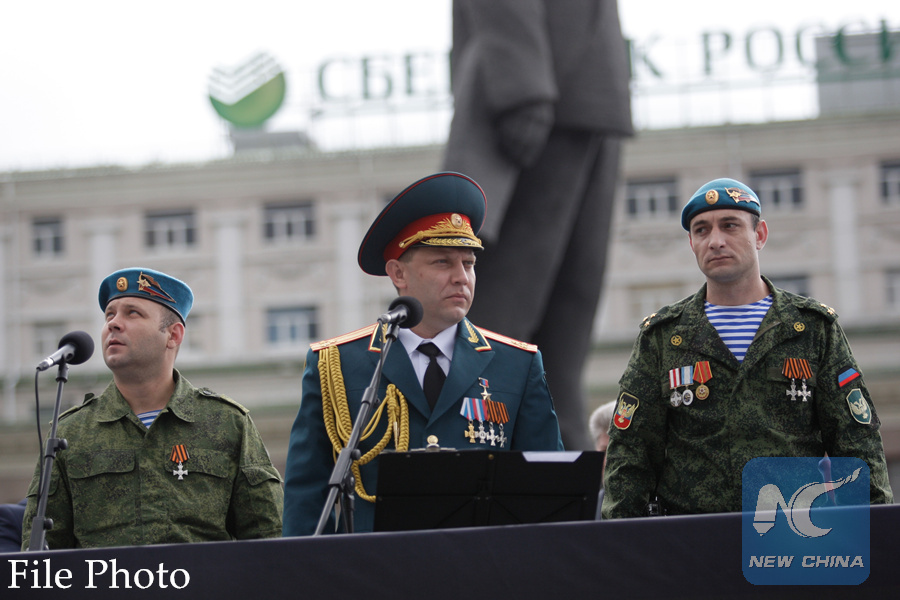Escalation of Ukrainian war bad news for Europe
- By Sumantra Maitra
 0 Comment(s)
0 Comment(s) Print
Print E-mail China.org.cn, September 5, 2018
E-mail China.org.cn, September 5, 2018

In a catastrophic escalation of the ongoing war in Eastern Ukraine, with a potential to destabilize the entire region, Alexander Zakharchenko, leader of the breakaway rebel region known as the Donetsk People's Republic, was assassinated.
Zakharchenko, who had Russian support, was at a café when a bomb exploded, inflicting fatal injuries. The separatist republic's finance minister was also injured in the blast that shattered a tentative calm that had settled on the region.
Zakharchenko's killing is the latest in an ongoing series of murders and assassinations that have rocked Ukrainian rebel territories, including, a few months back, that of another Kremlin-backed rebel commander nicknamed Motorola.
Russia described the latest incident as a terrorist attack and a "dastardly crime" intended to destabilize the fragile peace process.
President Vladimir Putin offered condolences to Zakharchenko's family, praising him as a patriot and fine leader, as the Russian State TV broadcast various tributes.
Although Putin didn't blame Ukraine outright for the bombing, he certainly hinted at its involvement, and Russian investigators quickly described it as an act of political terrorism. Russian foreign ministry spokesperson hinted that there was every reason to believe the government in Kiev was responsible, according to Reuters.
The Ukrainian foreign ministry, on the other hand, blamed it on internal fighting between rival rebel groups. The Ukrainian military claimed that it was an operation of Russian special forces, aiming to kill off rebel warlords acting independent of Kremlin's wishes, a suggestion made by Western analysis a few months back after the reporting of at least six such killings in the last three years.
There are of course three possibilities. One is that Ukrainian intelligence is behind the murders. That begs the question as to why this should be the case. Revenge or a decapitation strike could be a reason; however, it seems unlikely the Ukraine would want to remove the leadership of a faction it stands no chance of bringing to heel in the existing circumstances.
Ukrainian armed forces simply have no way of controlling the breakaway provinces in the far east of its territory closest to Russia, as they lack the material and technological superiority as well as the manpower to do so. Nor are NATO forces showing any sign of coming to help.
The other options seem less far-fetched, where either Western or Russian intelligence is assassinating these rogue leaders. While historically that has happened before, in Afghanistan under both the Soviets and Americans, it is unlikely in such a small region and a relatively minor conflict, as there are chances of being caught in the act with less opportunities to hide .
Ultimately, however, there is a much bigger concern, and that is the spread of the war into Europe. Unlike the Balkan wars in the 1990s, the world is no longer unipolar, nor is Russia at its weakest point in terms of power since the original Communist revolution.
Ukrainian conflict isn't as simple as is sometimes suggested in media reports. The primary force involved in this conflict is geostrategic, and offers some hints of how future conflicts might evolve.
A region considered vital for Russia to survive as a great power was moving slowly into an adversarial axis. Constantly egged on by the European Union, the move of Ukraine towards NATO and the EU has been considered a red line by every Russian post-Soviet administration.
The bottom line is, that Russia loses its key military supplies, strategic position in the region and a vital naval port (Sevastopol on the Black Sea), if Ukraine is lost to the West. World politics isn't fair, of course, but major powers do what they want, defending what they consider their strategic interests.
Unfortunately, this is a battle neither side can win. The West is not going to go to war with Russia over Ukraine, simply because the latter isn't that big of a strategic necessity for the West. Russia however wouldn't mind escalating, as this involves its very backyard.
The result is a simmering conflict, with a potential to flare up and create untold internal displacement. There are already thousands of Ukrainians who have been displaced to the Baltic states and Poland. That is likely to increase if the conflict escalates.
These assassinations therefore mark a significant escalation that bodes ill for Europe. Both sides should urgently show restraint.
Sumantra Maitra is a columnist with China.org.cn. For more information please visit:
http://m.keyanhelp.cn/opinion/SumantraMaitra.htm
Opinion articles reflect the views of their authors only, not necessarily those of China.org.cn.





